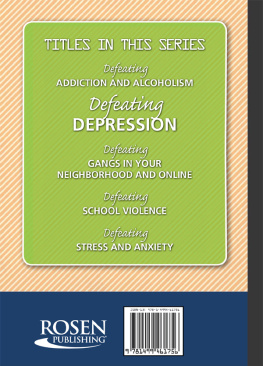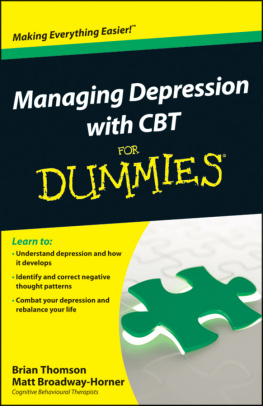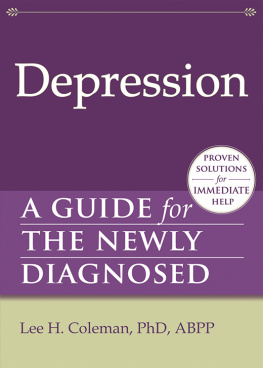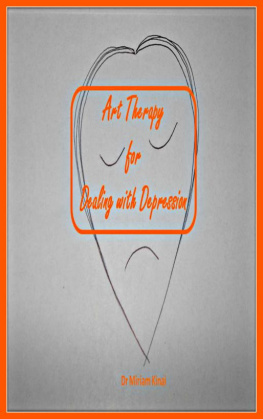Managing Your Depression
A JOHNS HOPKINS PRESS HEALTH BOOK
Managing Your DEPRESSION
What You Can Do to Feel Better
Susan J. Noonan, M.D., M.P.H.
Foreword by Timothy J. Petersen, Ph.D.,
Jonathan E. Alpert, M.D., Ph.D.,
and Andrew A. Nierenberg, M.D.

Note to the reader: The information in this book should by no means be considered a substitute for the advice of qualified medical professionals. Mental diseases and disorders have a wide range of symptoms and clinical presentations. You should always consult qualified medical professionals for the diagnosis and treatment of mental diseases and disorders. All efforts have been made to ensure the accuracy of the information contained in this book as of the date of publication. The author and the publisher expressly disclaim responsibility for any adverse outcomes arising from the use or application of the information contained herein.
If you are thinking about suicide, you should immediately contact your health care provider, go to the nearest Emergency Department, or call 9-1-1.
2013 The Johns Hopkins University Press
All rights reserved. Published 2013
Printed in the United States of America on acid-free paper
9 8 7 6 5 4 3 2
The Johns Hopkins University Press
2715 North Charles Street
Baltimore, Maryland 21218-4363
www.press.jhu.edu
Library of Congress Cataloging-in-Publication Data
Noonan, Susan J., 1953
Managing your depression : what you can do to feel better / Susan J. Noonan, M.D.,
M.P.H. ; foreword by Timothy J. Petersen, Ph.D., Jonathan E. Alpert, M.D., Ph.D.,
and Andrew A. Nierenberg, M.D.
pages cm
Includes bibliographical references and index.
ISBN 978-1-4214-0946-7 (hardcover : alk. paper)
ISBN 978-1-4214-0947-4 (pbk. : alk. paper)
ISBN 978-1-4214-0948-1 (electronic)
ISBN 1-4214-0946-1 (hardcover : alk. paper)
ISBN 1-4214-0947-X (pbk. : alk. paper)
ISBN 1-4214-0948-8 (electronic)
1. Depression, Mental. 2. Self-care, Health. I. Title.
RC537.N66 2013
616.8527dc23 2012036701
A catalog record for this book is available from the British Library.
Special discounts are available for bulk purchases of this book. For more information,
please contact Special Sales at 410-516-6936 or specialsales@press.jhu.edu.
The Johns Hopkins University Press uses environmentally friendly book materials,
including recycled text paper that is composed of at least 30 percent post-consumer
waste, whenever possible.
Tables and Forms
Tables
Forms
Foreword
About as many millions of individuals suffer from mood disorders in any given year as from cancer or diabetes. Among all medical conditions worldwide, mood disorders are recognized by the World Health Organization as among the most disabling. By affecting all domains of functioning, including sleep, appetite, energy, mood, motivation, self-esteem, judgment, and hopefulness, major depressive disorder and bipolar disorder interfere with the ability to work, study, maintain relationships, and carry on the very activities of daily living. Social isolation, poor self-care, and pessimism, core symptoms of depression, often become part of a pernicious cycle further reinforcing the impact of a mood disorder on an individual and on families and communities. The most devastating outcome of mood disorders is suicide, which occurs at a tragic rate of about one every 15 minutes in the United States. Although mood disorders, particularly depression, have been thought of in terms of individual episodes of illness, they have increasingly been recognized as often relapsing/remitting conditions that may extend over many years and benefit greatly from astute management through a collaboration between clinician and patient.
Fortunately, over the last three decades, a great deal has been learned about the effective treatment of mood disorders. Evidence-based medication and psychotherapeutic approaches along with novel pharmacological and nonpharmacological treatment strategies have improved our ability to manage illness acutely and prevent recurrence. We continue to learn more about the neurobiological and environmental contributions to mood disorders and how individualized factors may inform treatment choice. Compelling research efforts are underway to investigate the best ways to combine treatment approaches as well as how to prevent the onset of illness in those at risk but not yet affected. Given the prevalence, impact, and often long-term course of major depressive disorder and bipolar disorder, the value of effective treatment, persistence, and well-informed, engaged patients and families in the optimal management of mood disorders is all the more apparent.
In this book, Dr. Noonan courageously presents lessons learned during her years of combating a mood disorder. In stark contrast to a model in which patients are passive recipients of diagnosis and treatment, we hope readers will appreciate the overarching theme presented: the critical importance of proactively managing mental health. Dr. Noonan offers the reader comprehensive and accessible coverage of key concepts and principles that are translated into practical ready to use self-management skills. Among the books outstanding accomplishments are:
Inclusion of easy-to-read, accurate descriptions of signs and symptoms of mood disorder diagnoses
Review of medication treatment strategies with an emphasis on how to promote open dialogue between providers and patients
Presentation of graphic tools for use in tracking symptoms and challenging maladaptive thoughts and behaviors
Perhaps most impressive is the thorough coverage given to skills steeped in the tradition of cognitive and behaviorally based psychotherapies. These skills are predicated on the well-known fact that the way in which an individual thinks and behaves predictably changes during the course of a mood disorder. When depressed, an individual sees the world as half empty and selects for elements of the environment that support this negative view. Alternatively, while hypomanic or manic, an individual can view the world and himself or herself in an overly optimistic or even grandiose manner. Behaviors corresponding to these mood states include isolation/withdrawal and impulsivity/risk taking, respectively. Dr. Noonans book offers pragmatic and insightful methods to address both thoughts and behaviors altered during ones struggle with a mood disorder.
It is an honor to have worked with Dr. Noonan during her long battle with depression. As we hope Dr. Noonan has learned from us, we have learned much from her and incorporate these insights into our work with others. This book is emblematic of Dr. Noonans persistence, courage, expertise, willingness to disclose, and desire to share with others practical ways to successfully cope with and manage a mood disorder. We thank her for a contribution that will undoubtedly enhance the health and quality of life of many readers.
Timothy J. Petersen, Ph.D.
Jonathan E. Alpert, M.D., Ph.D.
Andrew A. Nierenberg, M.D.
The Massachusetts General Hospital
Department of Psychiatry
Boston, Massachusetts
Acknowledgments
This book is dedicated to a team of exceptional people who have made my life and this book possible. The superior clinical skills, extraordinary kindness, understanding, and perseverance of these professionals have been invaluable and have kept hope alive for me when I believed there was none. I owe my deepest thanks and gratitude to Drs. Andrew Nierenberg, Jonathan Alpert, Timothy Petersen, John Winkelman, Karen Carlson, and David Mischoulon. Additional thanks and appreciation go to Drs. Jeffery Huffman, Michelle Jacobo, and Marc Zuckerman for knowing just what to say and do during the darkest moments and for keeping me safe during those times. Last, I would like to recognize the remarkably skilled and caring nursing staff of Blake 11 for exceeding all expectations.
Next page








